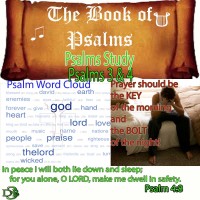

Read: Psalm 4:8 |
Pastor H.B. Charles tells the story about a woman he knew who showed up at church and prayed the same simple prayer week after week. Her simple prayer was, “O Lord, thank you Jesus!” The kids at church would start laughing every time she opened her mouth, because they knew that she would repeat the same prayer—”O Lord, thank you Jesus!”
Finally, somebody asked her, “Why do you pray the same little prayer?” She said, “Well, I’m just combining the two prayers that I know. You see, we live in a bad neighborhood. On some nights, there are bullets flying and I grab my daughter and we hide on the floor. In that desperate state, all I know how to cry out is, “O Lord!” But when I wake up in the morning and see that we’re okay, I just have to shout, “Thank you Jesus!” So, you see, combining my morning and evening prayers works for me – “O Lord, thank you Jesus!”
Psalm 3 and 4 are often described as the morning and evening Psalms. In these Psalms, David is a little more descriptive of the challenges before, behind and around him than our dear sister noted above. His morning prayer in Psalm 3 could be themed “Save Me, O My God”. While his evening prayer could be themed “Answer Me When I Call”. Actually, if we took a step back, one could say that “O Lord, thank you Jesus” pretty much sums up both of these Psalms!
About
Psalm 3 and Psalm 4 are attributed to David. They were believed to have been written as he was fleeing his son Absalom (see 2 Samuel 17). David’s prayers address God by acknowledging what He has done in the past and asking for new mercies to help him overcome the present crisis.
Psalm 4 introduces us to the phrase “For the director of music” in NIV or “To the Chief Musician” in KJV. This phrase appears at the beginning of 54 psalms and is believed to provide instructions to the musicians on how the Psalm should be sung. It also serves to underscore the prominent role of music in worship and devotion in the psalmist’s day.
A final notable nugget is that some references cite that Psalm 3 was to be sung in the morning and Psalm 4 in the evening. After all, prayer should be the key of the morning and the bolt of the night, as one Pastor once said.
Main Message –Ps 3 – Morning prayer for God’s Protection; Ps 4 – Evening prayer of trust in God
Both Psalms carry the same three-part outline – Challenge-Comfort-Confidence. They begin in the valley of David’s current challenge or concern in verses 1 and 2. After a “Selah” of pause and praise, he finds comfort in the hope and knowledge that God is on his side in verses 3-6. Both Psalms end with a crescendo by noting renewed and refreshed confidence that God is able, despite the circumstances.
Like David, we each are challenged every day. During our tumultuous time in the valley of challenges and concerns, God will use them to strengthen our faith and remind us of the true source of our hope.
Like David, we have the promise that God is our strong tower and a bulwark never failing. He will bear our burdens, if we let Him. Take a Selah moment, to pause, reflect and praise His name to regain your perspective.
After all, God never allows the challenge or trial to be greater than our ability to handle it. In David’s case, his son Absalom caused him more than one challenge. In the end, God foiled Absalom’s plan to overthrow his father’s kingdom (see 2 Samuel 17:14).
In our lives, we can learn that no matter what happens in our lives, not even the Absaloms of the world, can thwart the power of God. Knowing that makes me want to say – “O Lord, Thank you Jesus!”
Questions:
1. Discover –
A. I’m going through a situation now and the challenge is so big, all that I can say is “O Lord”. I’m looking forward to the day, that I can say “Thank you Jesus!” Have you been through the storms of life and reflectively realize that you’ve used the simple prayer “O Lord, Thank you Jesus” as well?
B. How did David view God based on these two Psalms? How do your views differ?
2. Develop –
A. The Challenge – Comfort – Confidence.
In some areas of my life, I am challenged, in others I am receiving comfort and others, I have confidence. Overall, I would say I am being “comforted”. What stage of life would you say you are predominantly in now?
3. Demonstrate –
A. When you are under a challenging circumstance and feel the weight of the possible consequences, do you still operate within the joy of the Lord? Personally, this convicted me recently and I had to remind myself to take a “selah” moment and move up to “comfort” because God will work it out!
Psalms
Overview – Part 1 – Why, What and Who
Overview – Part 2 – Poetry, Prayer and Power
Overview – Part 3 – 5 Books in One
Overview – Part 4 – The significance of Selah
Book 1
Psalm 1
Psalm 2
Psalm 3 and 4
